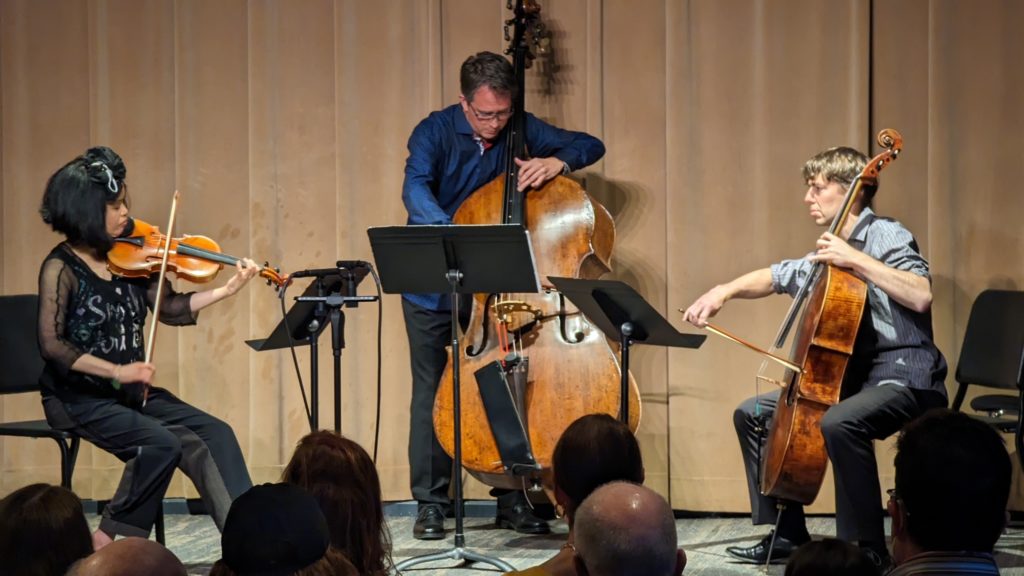The Chamber Ensemble In Triplicate Makes a Smashing Debut at San Diego State University’s Campanile Music Festival
When musicians form a traditional chamber ensemble, a string quartet or perhaps a piano trio, a wealth of repertory awaits such a group. But if your ensemble is a bit unusual in its composition—In Triplicate consists of a violin, a cello and a contrabass—you have to make your own way. There is no deep bin of published music awaiting your pleasure.
Fortunately, the In Triplicate crew of violinist Jasmine Lin, cellist Clancy Newman, and bassist Jeremy Kurtz-Harris turns out to be as skillful and creative at composition and arranging as the ensemble is virtuoso in instrumental performance. In Triplicate established its credentials in a dazzling, profound, and highly entertaining concert Tuesday at San Diego State University’s [SDSU] Campanile Music Festival.Opening the program with J. S. Bach’s ‘Aria’ from his Goldberg Variations, BWV 988, proved a clever deception. Jasmine Lin deftly phrased and graciously ornamented the aria’s simple melodic line, while her cohorts’ glowing sonority provided serene accompaniment. This quiet gem disclosed not the slightest hint of the volcanic pyrotechnics that would carry the remainder of the evening at SDSU’s intimate Scripps Cottage recital hall.
What could be musically promising about the banal nursery rhyme tune “Three Blind Mice,” which Lin chose as the source of her composition for In Triplicate, which she retitled “Three Fat Mice”? Lin sliced and diced the phrases of the silly tune, tossing them about at breakneck speed and treating them with every imaginable string technique—adding fierce rhythmic tapping on the bodies of the instruments to expand the texture. She gave herself—and why not—a rollicking virtuoso solo that would have made Art Tatum proud while Newman and Kurtz-Harris accompanied her with crisp, syncopated rhythms.
Kurtz-Harris took the Irish jig tune “Lanigan’s Ball” and devised an even more driving, exuberant trio titled “Lanigan’s Mashup.” He gave himself—again, why not—a flashy, jazz-inflected bass line that careened devilishly throughout the piece. Midway through the trio, Newman played an ardent, aptly legato account of the original tune, but most of the piece flew by in scorching triplets.
Clocking just under 25 minutes in length, Newman’s Three Familiar Tunes Not Heard Before proved the program’s most substantial offering with a colorful movement for each portion of the day: “Morning,” “Afternoon,” and “Evening.” Like his In Triplicate colleagues, edgy counterpoint is his calling card as composer, and although he appears comfortable with tonality, his progressions are not limited to the easy ones explained in a first-year music theory text.
From the violin’s perky, welcoming major mode theme that opens “Morning,” one might easily assume the Newman starts his day bright-eyed and bushy-tailed. With abundant, mellifluous themes that suggest the charm of hallowed folk songs, Newman allows the violin to dominate this movement, certainly a wise choice given Lin’s bright, vibrant yet perfectly focused sonority and supple technique.
Newman’s “Afternoon” suggests time for relaxation and reflection with its expansive, almost languorous main theme sumptuously communicated by the persuasive, plangent timbre of Newman’s own cello. In this movement, Newman has nestled a momentary foray that bristles with acidic clusters of violin harmonics as if to say, “Sure, I can write that avant-garde stuff that is the lingua franca of certain music departments, but I’m not going to bore my audience with an entire piece awash in it.”
Jazzy, syncopated, exuberant figurations flood “Evening”—time to party?—and each player has a chance to show their technical prowess navigating these themes. Midway through the movement, Newman launches into tongue-in-cheek variations on “London Bridge Is Falling Down” in both major and minor modes. Given Newman’s title, this humorous touch clearly amused his attentive audience before they savored the fireworks of his bravura finale.
Canadian composer Michael Oesterle was commissioned by a consortium of contrabass professionals including Kurtz-Harris to write his 2021 duo for cello and contrabass titled Parlour Games. Newman and Kurtz-Harris offered three contrasting movements out of the dozen that comprise this commission: intense contrapuntal studies that brought to mind the emotional rush of the famous baritone and tenor duet fro Bizet’s opera “The Pearl Fishers “Au fond du temple saint.” Kurtz-Harris’ resonant bass sonority and compelling phrasing was equaled by Newman in this resplendent duo.
The program’s piece that contrasted to the evening’s nonstop virtuosity, Karl Jenkins’ “Benedictus” from his The Armed Man: A Mass for Peace arranged by Lin, evoked the mystic grandeur of a vast cathedral. Newman’s glowing, emotionally probing account of Jenkins’ compelling themes truly blessed the assembly in the intimate space of Scripps Cottage.
No doubt it will take time a pull together a suitable, varied repertory for this unusual chamber ensemble, but when that happens In Triplicate will be ready to impress audiences far beyond San Diego.
This program featuring the ensemble In Triplicate was presented by San Diego State University’s School of Music and Dance in the university’s Scripps Cottage on April 25, 2023.

Ken Herman, a classically trained pianist and organist, has covered music for the San Diego Union, the Los Angeles Times’ San Diego Edition, and for sandiego.com. He has won numerous awards, including first place for Live Performance and Opera Reviews in the 2017, the 2018, and the 2019 Excellence in Journalism Awards competition held by the San Diego Press Club. A Chicago native, he came to San Diego to pursue a graduate degree and stayed.Read more…

